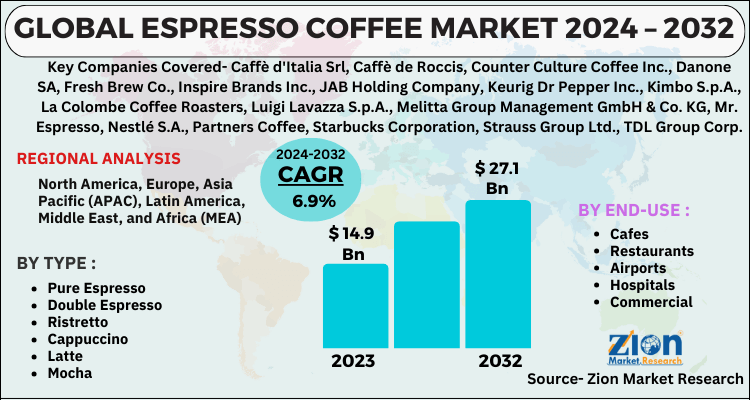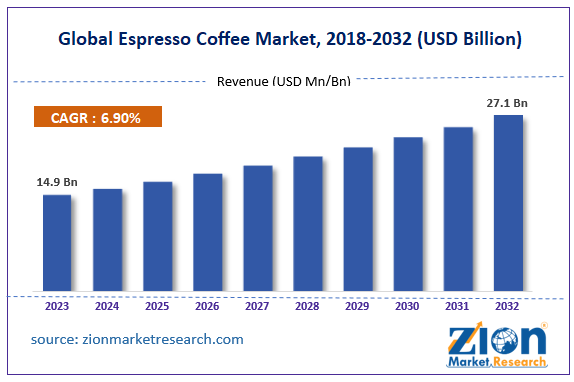Espresso Coffee Market Size, Share, Trends, Growth 2032

Espresso Coffee Market By Type (Pure Espresso, Double Espresso, Ristretto, Cappuccino, Latte, Mocha, Macchiato, and Americano), By End-Use (Cafes, Restaurants, Airports, Hospitals, and Commercial), and By Region - Global and Regional Industry Overview, Market Intelligence, Comprehensive Analysis, Historical Data, and Forecasts 2024 - 2032
| Market Size in 2023 | Market Forecast in 2032 | CAGR (in %) | Base Year |
|---|---|---|---|
| USD 14.9 Billion | USD 27.1 Billion | 6.9% | 2023 |
Espresso Coffee Industry Perspective:
The global espresso coffee market size was worth around USD 14.9 billion in 2023 and is predicted to grow to around USD 27.1 billion by 2032, with a compound annual growth rate (CAGR) of roughly 6.9% between 2024 and 2032.
Espresso Coffee Market: Overview
Espresso is defined as strong and full-flavored coffee that is served in shots. Using an espresso machine, pressure hot water is forced through extremely finely ground coffee beans to create it. When air bubbles mix with the soluble oils of fine-ground coffee, a dark froth known as "crema" appears on top of a properly pulled shot of espresso, creating a stronger-than-coffee liquid. Espresso's rich flavor and lasting aftertaste are enhanced by the crema.
The expresso coffee market is driven by several factors, such as growing coffee consumption globally, the rising popularity of specialty coffee, the expansion of coffee chains, and increasing health and wellness trends. However, the increasing competition from alternative beverages acting as a major restraining factor for the industry expansion.
Key Insights
- As per the analysis shared by our research analyst, the global espresso coffee market is estimated to grow annually at a CAGR of around 6.9% over the forecast period (2024-2032).
- In terms of revenue, the global espresso coffee market size was valued at around USD 14.9 billion in 2023 and is projected to reach USD 27.1 billion by 2032.
- The increasing product launch is expected to drive the espresso coffee market over the forecast period.
- Based on type, the cappuccino segment is expected to dominate the espresso coffee market over the forecast period.
- Based on end-use, the cafe segment is expected to hold the largest market share over the forecast period.
- Based on region, North America is expected to dominate the market during the forecast period.
Espresso Coffee Market: Growth Drivers
Rising urbanization and increasing disposable income drive market growth
Urbanization in emerging nations and rising disposable income are significant elements driving the espresso coffee market growth. Customers in emerging nations are increasingly choosing luxury goods and lifestyles, like specialty coffee, as their disposable income increases.
Additionally, it is primarily occurring in urban areas, where there are an increasing number of cafes and coffee shops. The growing habit of patrons visiting coffee shops to socialize there reflects the growing number of these establishments. As a result, the growing number of businesses offering espresso-based coffee and beverages helps the industry grow.
Espresso Coffee Market: Restraints
Competition from alternatives hinders market growth
As customers search for drink options other than traditional coffee, alternative beverage competition seriously threatens the espresso coffee industry. Particularly among health-conscious consumers looking for functional beverages or ones with less caffeine, non-coffee substitutes, including herbal teas, kombucha, and energy drinks, have been increasingly popular. Companies such as GT's Kombucha and other herbal tea businesses have seen substantial development since their appeal to consumers who value wellness and are looking for cool, caffeine-free alternatives. Furthermore, the expanding customer preferences for plant-based beverages, such as oat milk lattes and herbal infusions, has ultimately slowed market growth.
Espresso Coffee Market: Opportunities
Growing product launch offers a lucrative opportunity for market growth
The rising product launch is expected to offer a lucrative opportunity for the expresso coffee market growth over the forecast period. For instance, in April 2024, by providing a new generation of coffee enthusiasts with even more opportunities to enjoy the growing popularity of espresso-based and cold coffees at home, quickly and easily, NESCAFÉ®, the largest coffee manufacturer in the world, is meeting customer demand. The U.S. portfolio now includes NESCAFÉ® Gold Espresso and NESCAFÉ® Ice Roast. Whether the person prefers their coffee hot or cold, boiling or iced, NESCAFÉ understands that everyone has different tastes and feels that everyone should have a fantastic cup.
Espresso Coffee Market: Challenges
High costs of equipment and ingredients pose a major challenge to market expansion
One of the biggest obstacles to the growth of the espresso coffee industry is the high cost of high-quality ingredients and equipment. The cost of advanced espresso machines for cafes and restaurants can vary from $5,000 to $25,000, depending on the model and features. Energy use, upkeep, and repairs raise operating costs even more.
Furthermore, premium, freshly roasted coffee beans, which are more expensive than regular coffee beans, are typically required for espresso. Depending on the supplier and processing method, premium beans can range in price from $15 to $40 per pound. Thus, this is expected to pose a major challenge to the industry growth.
 Request Free Sample
Request Free Sample
Espresso Coffee Market: Report Scope
| Report Attributes | Report Details |
|---|---|
| Report Name | Espresso Coffee Market |
| Market Size in 2023 | USD 14.9 Billion |
| Market Forecast in 2032 | USD 27.1 Billion |
| Growth Rate | CAGR of 6.9% |
| Number of Pages | 215 |
| Key Companies Covered | Caffè d'Italia Srl, Caffè de Roccis, Counter Culture Coffee Inc., Danone SA, Fresh Brew Co., Inspire Brands Inc., JAB Holding Company, Keurig Dr Pepper Inc., Kimbo S.p.A., La Colombe Coffee Roasters, Luigi Lavazza S.p.A., Melitta Group Management GmbH & Co. KG, Mr. Espresso, Nestlé S.A., Partners Coffee, Starbucks Corporation, Strauss Group Ltd., TDL Group Corp., The J. M. Smucker Company, The Kraft Heinz Company, Torrefazione Mokaflor Srl, TreeHouse Foods Inc. Company, Trucillo SpA, Vergnano S.p.A., Verve Coffee Roasters, and others. |
| Segments Covered | By Type, By End-Use, and By Region |
| Regions Covered | North America, Europe, Asia Pacific (APAC), Latin America, Middle East, and Africa (MEA) |
| Base Year | 2023 |
| Historical Year | 2018 to 2022 |
| Forecast Year | 2024 - 2032 |
| Customization Scope | Avail customized purchase options to meet your exact research needs. Request For Customization |
Espresso Coffee Market: Segmentation
The global espresso coffee industry is segmented based on type, end-use, and region.
Based on the type, the global espresso coffee market is segmented into pure espresso, double espresso, ristretto, cappuccino, latte, mocha, macchiato, and americano. The cappuccino segment is expected to dominate the market over the forecast period. A popular beverage throughout the world, cappuccino appeals to both regular coffee consumers and those looking for decadent coffee experiences. Furthermore, cappuccinos have become a standard menu item due to the growth of international coffee chains like Starbucks and Costa Coffee as well as regional specialty cafés. Thus driving the segment growth.
Based on end-use, the global espresso coffee industry is bifurcated into cafes, restaurants, airports, hospitals, and commercial. The cafe segment is expected to hold the largest market share over the forecast period. The main venues for selling espresso beverages are cafes, which serve standard menu items such as flat whites, macchiatos, lattes, and cappuccinos. Espresso culture has spread throughout the world due to cafes, which have made it a widespread beverage instead of a specialty one. Additionally, independent cafes elevate the espresso experience by emphasizing premium beans, exact brewing methods, and latte art.
Espresso Coffee Market: Regional Analysis
North America dominates the market over the projected period
North America is expected to dominate the global espresso coffee market. Particularly in the United States and Canada, North America is one of the primary regions of coffee consumption worldwide. Espresso-based beverages, including macchiatos, lattes, and cappuccinos, define the coffee industry of the area.
Furthermore, big coffee chains, especially Starbucks, have tremendously helped to explain the popularity of espresso drinks in North America. These chains provide a variety of espresso-based beverages and maintain strong customer involvement using their marketing efforts and loyalty programs. Also, the growing number of coffee drinkers and at-home coffee making are driving North American consumers to buy grinders and espresso equipment. From entry-level models to high-end, professional machines, premium espresso makers for domestic use are increasingly readily available.
Espresso Coffee Market: Competitive Analysis
The global espresso coffee market is dominated by players like:
- Caffè d'Italia Srl
- Caffè de Roccis
- Counter Culture Coffee Inc.
- Danone SA
- Fresh Brew Co.
- Inspire Brands Inc.
- JAB Holding Company
- Keurig Dr Pepper Inc.
- Kimbo S.p.A.
- La Colombe Coffee Roasters
- Luigi Lavazza S.p.A.
- Melitta Group Management GmbH & Co. KG
- Mr. Espresso
- Nestlé S.A.
- Partners Coffee
- Starbucks Corporation
- Strauss Group Ltd.
- TDL Group Corp.
- The J. M. Smucker Company
- The Kraft Heinz Company
- Torrefazione Mokaflor Srl
- TreeHouse Foods Inc. Company
- Trucillo SpA
- Vergnano S.p.A.
- Verve Coffee Roasters
The global espresso coffee market is segmented as follows:
By Type
- Pure Espresso
- Double Espresso
- Ristretto
- Cappuccino
- Latte
- Mocha
- Macchiato
- Americano
By End-Use
- Cafes
- Restaurants
- Airports
- Hospitals
- Commercial
By Region
- North America
- The U.S.
- Canada
- Europe
- France
- The UK
- Spain
- Germany
- Italy
- Rest of Europe
- Asia Pacific
- China
- Japan
- India
- South Korea
- Southeast Asia
- Rest of Asia Pacific
- Latin America
- Brazil
- Mexico
- Rest of Latin America
- Middle East & Africa
- GCC
- South Africa
- Rest of Middle East & Africa
Table Of Content
Methodology
FrequentlyAsked Questions
Espresso is defined as strong, full-flavored coffee served in shots. An espresso machine forces pressure hot water through extremely finely ground coffee beans to create it.
The espresso coffee market is driven by several factors, such as rising disposable income, technological advancements, increasing coffee culture, rising awareness, and others.
According to the report, the global espresso coffee market size was worth around USD 14.9 billion in 2023 and is predicted to grow to around USD 27.1 billion by 2032.
The global espresso coffee market is expected to grow at a CAGR of 6.9% during the forecast period.
The global espresso coffee market growth is expected to be driven by North America. It is currently the world’s highest revenue-generating market due to the presence of well-established café chains and increasing health and wellness trends.
The global espresso coffee market is dominated by players like Caffè d'Italia Srl, Caffè de Roccis, Counter Culture Coffee, Inc., Danone SA, Fresh Brew Co., Inspire Brands, Inc., JAB Holding Company, Keurig Dr Pepper Inc., Kimbo S.p.A., La Colombe Coffee Roasters, Luigi Lavazza S.p.A., Melitta Group Management GmbH & Co. KG, Mr. Espresso, Nestlé S.A., Partners Coffee, Starbucks Corporation, Strauss Group Ltd., TDL Group Corp., The J. M. Smucker Company, The Kraft Heinz Company, Torrefazione Mokaflor Srl, TreeHouse Foods Inc. Company, Trucillo SpA, Vergnano S.p.A., and Verve Coffee Roasters among others.
The espresso coffee market report covers the geographical market along with a comprehensive competitive landscape analysis. It also includes cash flow analysis, profit ratio analysis, market basket analysis, market attractiveness analysis, sentiment analysis, PESTLE analysis, trend analysis, SWOT analysis, trade area analysis, demand & supply analysis, Porter’s five forces analysis, and value chain analysis.
RelatedNews
HappyClients
Zion Market Research
Tel: +1 (302) 444-0166
USA/Canada Toll Free No.+1 (855) 465-4651
3rd Floor,
Mrunal Paradise, Opp Maharaja Hotel,
Pimple Gurav, Pune 411061,
Maharashtra, India
Phone No +91 7768 006 007, +91 7768 006 008
US OFFICE NO +1 (302) 444-0166
US/CAN TOLL FREE +1 (855) 465-4651
Email: sales@zionmarketresearch.com
We have secured system to process your transaction.
Our support available to help you 24 hours a day, five days a week.
Monday - Friday: 9AM - 6PM
Saturday - Sunday: Closed





